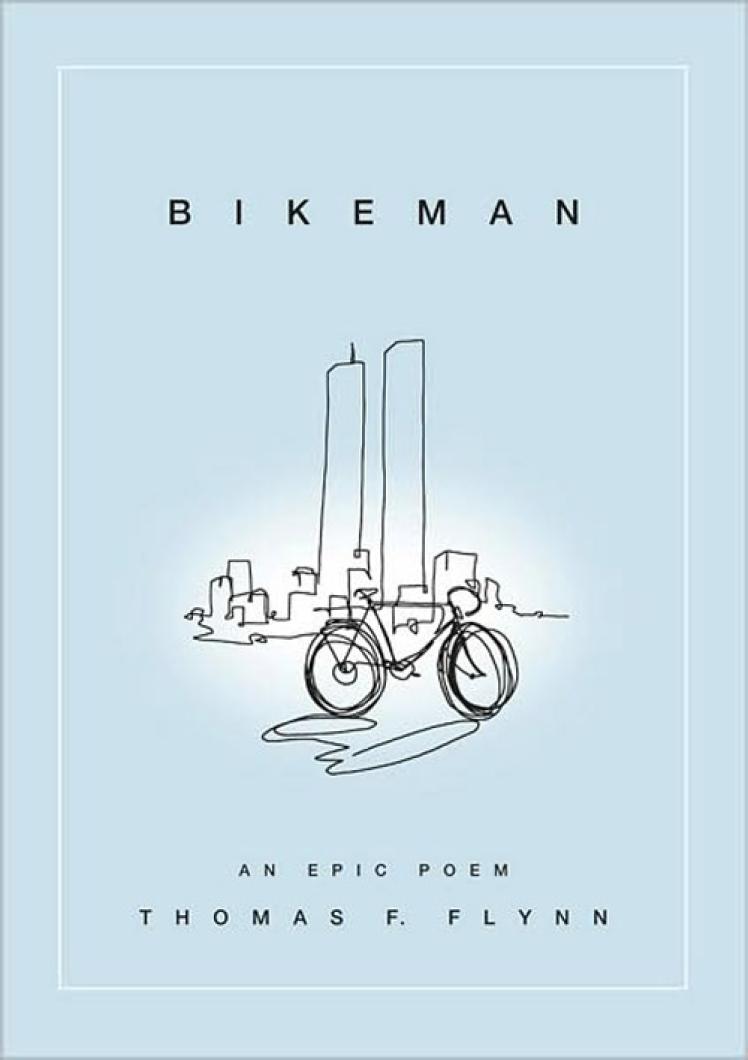Television journalist Thomas Flynn was sitting in the back garden of his Greenwich Village apartment, midway through a coffee, when he heard, then saw the plane fly over on its way to World Trade Center One on 9/11.
On instinct, he shoved some pens, a notebook and cell phone in a bag and set off on his bike for Wall Street.
He arrived to see despairing workers leaping to their deaths from the burning buildings, indelible images for anyone who watched a television, or picked up a newspaper in the coming months. Mr. Flynn describes his experience in his epic poem, Bikeman.
Again I try to hear them as they loose their screams
With smoke pouring out from their backs.
Mr. Flynn recited these lines last week, in the dining room of the Edgartown Yacht Club, on the first stop of a book tour to promote the work. Sporting a gold-buttoned navy blazer, white chinos and a bushy moustache, he addressed a room of members while club waiters put the finishing touches on lunch settings.
In babbling silence they speak to me:
“Tell my son I love him!”
“Tell my wife I miss her!”
“Tell my dear ones . . .”
Shortly after arriving on West street at the foot of Tower One, Mr. Flynn spotted Eddy Remy, a corporate video artist who had been working for Merrill Lynch in the Tower Two of the World Trade Center.
“I said ‘Right, now you’re working for CBS,’” Mr. Flynn recalled.
When the first tower collapsed, Mr. Flynn and Mr. Remy ran for their lives. With a small group, Mr. Flynn ran into a garage, which was quickly entombed in smoke and dust. One member of the group was a medic named Avi. He referred to Mr. Flynn, who gripped tight to his bicycle throughout, as Bikeman.
Though sure he was going to die, suffocated in the garage, Mr. Flynn got out, led to an opening by the medic. He then felt — and smelled — his way to the bank of the Hudson River, and was up near Houston street when the second tower collapsed.
He got back on his bike and cycled straight up from the river, and within 30 minutes he was at the CBS broadcast center and on the air, being interviewed by Dan Rather, still out of breath and his hair matted with dust.
“There was an explosion . . .,” he says in the interview (viewable at bikeman1.com), “the whole building at that point bellied out in flames. Everybody ran, I mean everyone who could. There’s an awful lot of places you couldn’t hide down there. The crowd I was with — and I lost my camera man. I don’t know he’s alive or dead. We ran into a parking garage and the smoke the dust — you can see it — it chased us in there.”
At around 2 p.m. Mr. Remy called in to CBS from an apartment on the other side of the Hudson River.
“Boy, that was a good phone call to take,” said Mr. Flynn, “and I think he was pretty pleased to hear from me.”
But after the attacks Mr. Flynn saw little of Mr. Remy, who soon returned to his native Jamaica. He has never found out Avi’s last name.
“I haven’t looked for either of them,” he told an audience member at the yacht club. “There’s a lot of things I haven’t done. I haven’t revisited the spot even though I ride my bike near there regularly. I’ve not been interested in finding Avi, though he’s in my mind all the time. I know he lives in Williamsburg, and there was Hebrew written on the side of the ambulance. He might find me. Wouldn’t that be nice?”
The following year Mr. Flynn bought a second home in Harwich Port, Cape Cod, where he lives half the year, with his wife Nancy Reardon. He wrote up his notes and always intended to use them for something, but it wasn’t until the summer of 2005, when he checked Dante’s Inferno out of the library for some summer reading, that he hit on the idea of putting the story to verse as an epic poem.
“It’s the only poem I’ve ever written except for one for Nancy on her wedding day,” he said. “Not a recommended business model.”
Despite the esoteric format, he found a publisher with relative ease.
“It’s a very entertaining style of storytelling, but it’s the great vehicle, especially for an epic, and this was an epic event,” he said.
If the refined setting of the yacht club was at odds with the horror of Bikeman, the producer turned poet was glad to start on his book tour with a sympathetic audience.
“It doesn’t matter if you’re poor, or Republican, urban, rural or whatever,” he said after the reading, “it’s everyone’s story. It was experienced by billions of people directly.”
Mr. Flynn, 61, worked in print and radio journalism before beginning a 30-year, award-winning career at CBS. In 1988 he was a founder of the CBS news show 48 Hours. His work for the network, which took him across the world, was often perilous. Mr. Flynn remembered one incident, again in his home town, when he was covering the New York crack epidemic in the 1980s and was threatened with an automatic rifle.
“The biggest threats to my life during my career were in New York,” he said.
These days though, when Mr. Flynn is not reciting poetry, he is working on a documentary which follows two researchers from the Wood Hole Oceanographic Institute.
“It’s an amazing story,” he said. “And going out to work on a boat everyday, how bad is that?”




Comments
Comment policy »